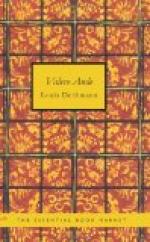Nutrition is seriously hampered by the long duration of the illness, usually considerable lack of appetite and the absolute necessity of nursing the ulcerous intestines in the most studiously careful way.
In cases which develop to the highest degree, it naturally follows that the patient wastes away to a great extent.
In the first place, all solid food must be strictly avoided. Too great stress cannot be laid on this point, since the patient, especially in lighter cases, frequently shows a strong desire for food—especially fruit.
Any lack of firmness and caution in this respect may have the most disastrous consequences. Many a patient suffering from typhus has lost his life or experienced a bad relapse and hemorrhages of the intestines through a mistake in diet,—through taking too much or unsuitable food.
The most critical period for the liability to hemorrhage, which in some cases is very profuse, is the third, and in lighter cases, the second week, when the crust of the intestinal ulcers begins to scale off.
The diet list, as in cases of typhus, consists of Form II, and milk; and it should be made a rule to confine it strictly to the most simple food, bouillon, mucilaginous soups, milk, undiluted or with tea, everything prepared with a little egg. Cream will sometimes agree with the patient.
The stools will indicate the digestion or otherwise of the milk. If there are many morsels of casein apparent in the same, the quantity of milk must be reduced and given in diluted form. The use of meat juice, liquid or frozen, and meat jelly, is quite permissible. Although neither of these preparations are very strong, they must be considered as important building-stones for the nourishment of the patient, and they offer a little variety, which is often most desirable.
Drinks. For drinking, usually fresh water is used, also bread and albumen water, especially Dechmann’s Plasmogen, 15 grains in one pint of water, a mouthful from time to time alternating with Dechmann’s Tonogen.
Great caution must be used in regard to fruit juices and lemonade on account of the danger of irritation of the intestines.
Carbonated and other mineral waters must be strictly avoided, since they only add to the usually prevailing meteorism, or gas in the abdominal cavity.
Albumen water, which is occasionally used in case of febrile disease and intestinal catarrh of children, is prepared by mixing the white of an egg and two to four spoonfuls of sugar in a tumbler of water. This is strained and cooled before being used. It is easily understood that by this we generate new life in the patient, so to speak, through the albumen, since it contains a large quantity of tissue building material, which in turn prevents catabolism or destruction of the organism, this as contrasted with the methods of the old regime which dooms the patient to certain death by opiates,—a course frequently resorted to by inexperienced practitioners.




